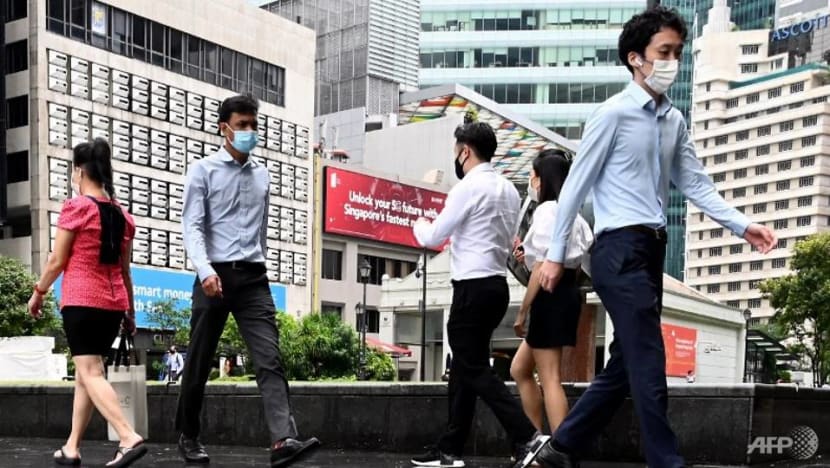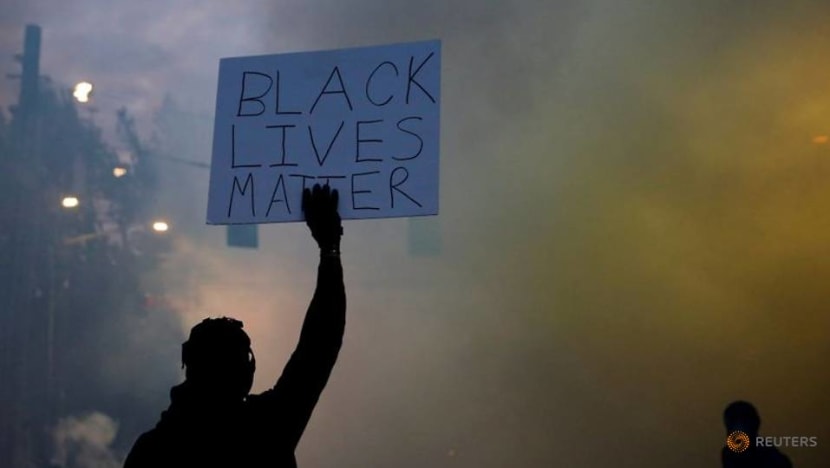commentary Commentary
Commentary: How COVID-19 has forced employers to be more human – and rewards them in the process
The COVID-19 pandemic will force a rethinking on how firms approach to human capital, says Crystal Lim-Lange.

Office workers are seen in the financial business district in Singapore on Nov 23, 2020. (Photo: AFP/Roslan Rahman)
SINGAPORE: In the 1970s, renowned economics professor Milton Friedman wrote a famous essay explaining that the only purpose of a business was to generate profit, and the sole focus of the CEO, to rally the human capital of the company around that cause.
Since then, corporates around the world have adopted profit as their religion, operating with their eyes firmly fixed to the bottom line and a firm foot on the gas pedal.
Then COVID-19 entered, upending this simple equation of big profits equals a good business.
READ: Commentary: Goodbye, Robinsons. You may soon be with familiar company
READ: Commentary: Retail isn’t dead – look at snaking queues outside Apple stores
THE COMING CHANGE TO HOW FIRMS MANAGE HUMAN CAPITAL
Some companies, like Amazon, Zoom and many others profited massively by virtue of being in the right place at the right time.
Yet, many other well-run and well-loved companies, like Singapore Airlines, found themselves bleeding further into the red every day through no fault of their own.
The sad sight of SIA jumbo jets, grounded next to a quiet airport, coupled with news of the company’s fighting spirit demonstrated in its COVID-19 response, from reviewing fleet sizes, to having flight attendants joining frontline efforts and offering novel dining experiences, show a company’s value cannot be purely assessed on profits.
READ: Commentary: Asian airlines may never recover without consolidation
LISTEN: Rethinking the role of national carriers while saving Singapore Airlines
What makes a company valuable is also its purpose, contribution and humanity – and what it’s doing to help other businesses, communities and people get through this generation-defining crisis.
This global trend towards purpose over profits was already gaining momentum even before COVID-19 hit.

In August 2019, a letter issued by the Business Roundtable, signed by 181 leading US companies from Apple to Walmart, essentially rebuked Friedman’s worldview by declaring that they would commit to deliver value not just to shareholders, but also to their four other stakeholder groups - employees, customers, suppliers and communities.
“One of the definitive results of the pandemic around the world is that we can see the old Milton Friedman model crumbling. No one believes that anymore. The pandemic hasn’t changed everything, but we are starting to see much more concern for people,” Bob Aubrey, founder of the ASEAN Human Development Organisation told me.
The pandemic will more deeply shape our approach to human capital, making employees care more about inclusivity, investing in mental well-being, empowering our workforce with more flexibility in how they work, and ultimately shifting the focus of businesses to purpose, not just profits.
Even for pragmatic Asia, companies will be forced to look at human factors such as diversity, inclusion and stress indicators, and move beyond paying lip service to these issues for a few powerful reasons.
READ: Commentary: The cult of work is eroding the value of parenthood
READ: Commentary: Burned out while working from home? You should check your work-life boundaries
A CULTURE THAT CONTRIBUTES TO PROFITS
First, there is a consensus that a caring, inclusive culture is directly linked to more profits.
For instance, Deloitte’s research found organisations with inclusive cultures twice as likely to meet or exceed financial targets and eight times more likely to achieve better business outcomes.
Companies with high levels of purpose outperform the market by 5 to 7 per cent annually, growing faster with higher profitability, empirical research on 1.5 million employees from Professors Claudine Gartenberg and George Serafeim from the University of Pennsylvania Wharton Business School and Harvard Business School respectively shows.
Futhermore, McKinsey’s findings from more than 1,000 companies in 15 countries suggests a growing performance gap between inclusive companies that “get it” and companies yet to embrace diversity.

Companies in the bottom quartile for gender and ethnic diversity were 27 per cent more likely to underperform on profitability.
COVID-19 will do more to separate the goat from the sheep.
I have seen this in Singapore, where companies who haven’t prioritised inclusion are now in a vicious cycle of low employee morale, high turnover and burnout, which fuels even more underperformance and less management focus on inclusion as they are too busy fighting fires.
On the other hand, I have also seen a wave of companies developing a virtuous cycle of investing in a caring, purposeful culture, doubling efforts to amplify employee support, psychological safety and inclusive leadership training.
READ: Commentary: Work appraisals can’t depend on what your boss thinks of you
READ: Commentary: Worried about keeping your job? Here’s advice to soothe your concerns no matter how old you are
A WORKFORCE THAT CARES ABOUT THEIR COMPANY’S VALUES
Second, a younger workforce demands a more flexible, inclusive and values-driven approach to work, and employers who want to attract and retain talent, a scarce resource that remains in high demand, will have to listen.
Millennials are now the biggest segment of the workforce, Gen Zs are starting to enter the labour market.
Research suggests they are much more purpose driven than other generations. They want to join companies that align with their values, with LinkedIn’s research finding almost nine out of 10 Millennials would take a pay cut to work at a company with the same values as their own. This figure was just 9 per cent of baby boomers.

This makes sense as the Millennials and Gen Zs will probably be spending more time at work than any other preceding generation, and want to contribute to something they care about.
CONSUMERS WHO CONSUME RESPONSIBLY
Third, consumers and clients are choosing to spend their dollars with corporates who signal a high level of environmental social governance (ESG), including employee treatment, and diversity and inclusion metrics.
Morgan Stanley's Institute for Sustainable Investing’s survey concluded that 86 per cent of millennials are interested in sustainable investing and are twice as likely as the overall investor population to invest in companies targeting social or environmental goals.
Bank of America Merrill Lynch predicted that millennials could pour between US$15 trillion and US$20 trillion into Environmental, Social and Corporate Governance (ESG) investments in the US in the next two decades.
LISTEN: What is corporate climate action and why companies need a paradigm shift | EP 11
READ: Commentary: Forces of climate action are reshaping finance in Singapore and around the world
The stakes are high for companies who do not keep up with the current consciousness. In 2020, we have also seen clear the “cancel culture” financial repercussions for companies deemed to have been hypocritical in their values or mistreated their employees.
Just think about how Starbucks’ memo asking employees not to wear Black Lives Matter T-shirts led to instant global backlash from consumers.
The Instagram movement #PullUpOrShutUp has convinced more than 200 companies, including Estée Lauder companies and Levi’s, to reveal how many Black employees they have and commit to improve.
And fashion advocacy non-profit Remake has announced an estimated US$22 billion owed to garment workers that have gone unpaid since March owing to the coronavirus from 21 brands, including H&M and Nike, after calling on brands to #PayUp via an Instagram campaign.

Consumers and employees today have never been more vocal. They also possess the platform, knowledge and desire to call businesses out for their failings.
According to Edelman’s study, 64 per cent of consumers around the world will buy or boycott a brand solely because of its position on a social or political issue.
READ: Commentary: Facebook’s decision to resist advertiser boycott could pay off in the long run
MENTAL HEALTH HAS BECOME A KEY CORPORATE CHALLENGE
Fourth, we are experiencing a major rise in firms offering mental health support for their staff as companies grapple with the realisation that burnout and stress has serious impact on business.
Employee Assistance Programme providers are reporting an uptick in companies signing up for counselling. Most of my corporate clients have significantly increased their mental health and resilience training budget this year.
This is an encouraging and much needed trend as Singapore is regularly voted as having one of the world’s most stressed and sleep-deprived workforces, even before COVID-19.
Over 1 in 3 employees report often feeling tired or having little energy and over 2 in 5 employees feeling burned out and exhausted from work, according to a SHRM study.
READ: Commentary: What’s behind burnout? Confusing long hours and face time for work performance
LISTEN: Returning to the office – can you say no?
While employers are upping support, we also need leaders themselves to normalise talking about mental health and demonstrating by example, taking concrete actions to alleviate stress by reducing work hours or having policies on not working on weekends or minimising late-night conference calls.
DEEPER RELATIONSHIPS AMONG WORKERS
Last, COVID-19 has forced companies to relax policies regarding working from home.
While most used to tolerate the occasional remote working arrangement, this pandemic has led many employers to realise trusting their employees to get their work done without constant onsite supervision can lead to increased productivity.

Zoom meetings have also provided an unusually intimate glimpse into our colleagues’ lives.
We discover new things about each other as we see people’s tattered posters and plant collections, what they really look like without make-up, and how they speak with their pets and children when they are interrupted.
We have gone from seeing our colleagues as mere transactions to connect and exchange data with, to real human beings who live, love and suffer just as we do, imbuing work with deeper and more human dimensions.
READ: Commentary: Cure to burnout requires a pervasive culture of rest
The real gift of this pandemic may well be the start of a more conscious, human-centric approach to work.
A caring, purposeful, flexible work human capital approach can no longer be seen as a nice-to- have.
It is the foundation on which a company builds its future survival on: Put people and purpose first and the profits will follow.
Crystal Lim-Lange is co-author of the national bestselling book Deep Human- Practical Superskills for a Future of Success and the co-founder of Forest Wolf, a leadership training and talent development consultancy.












